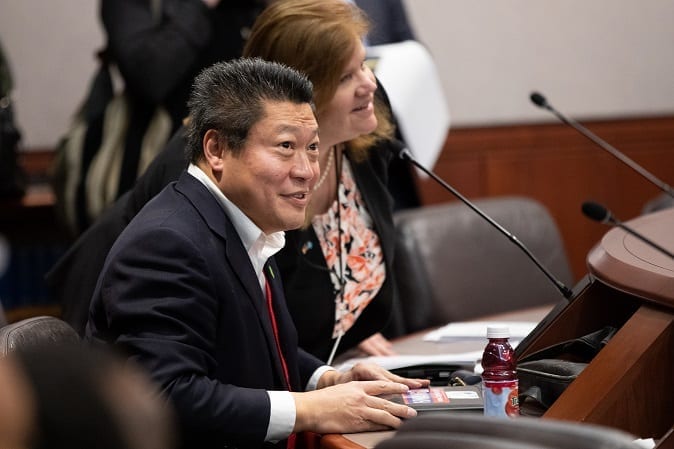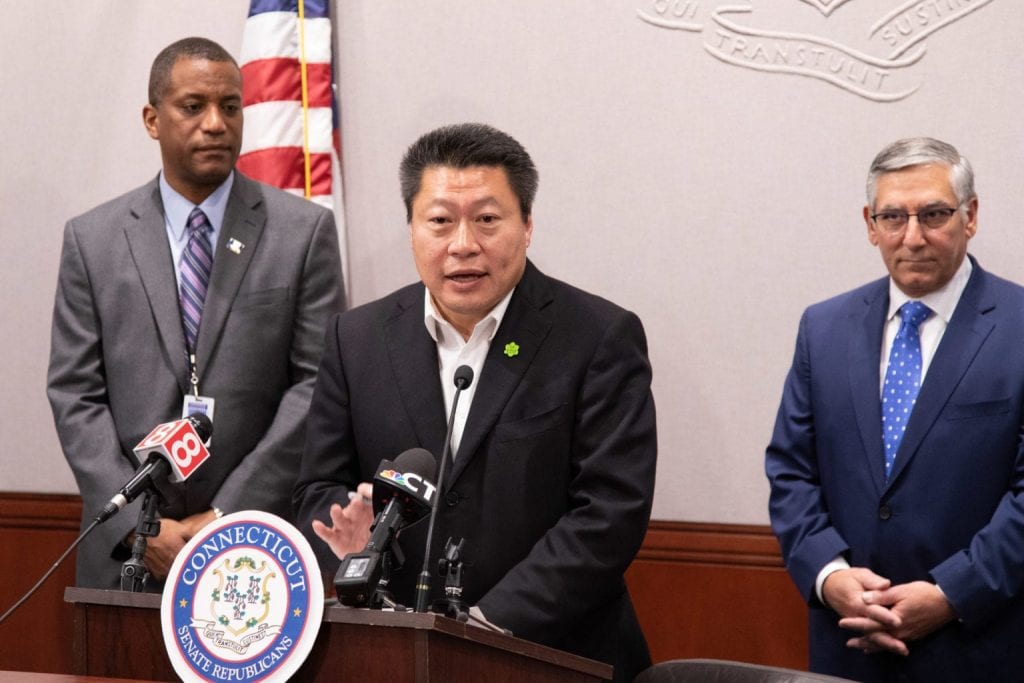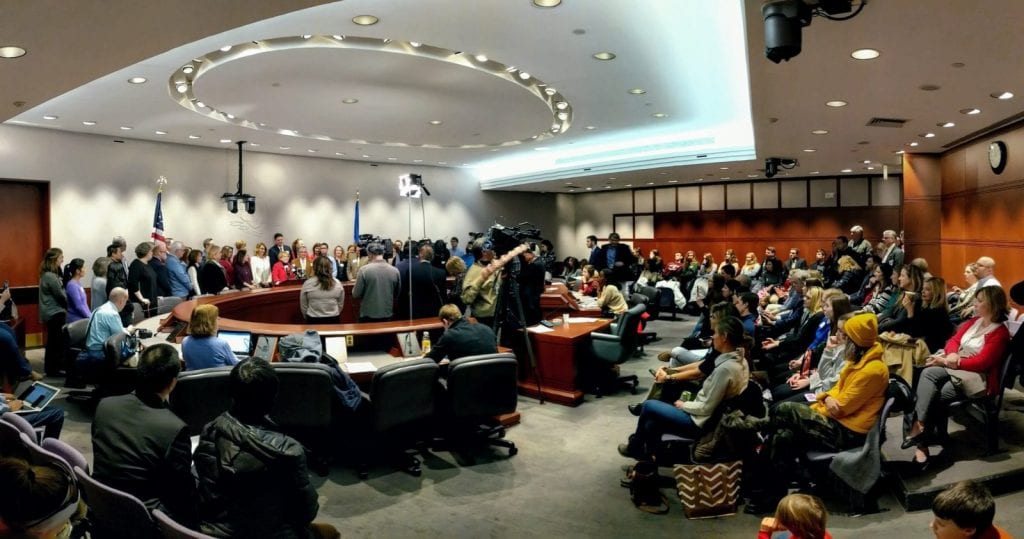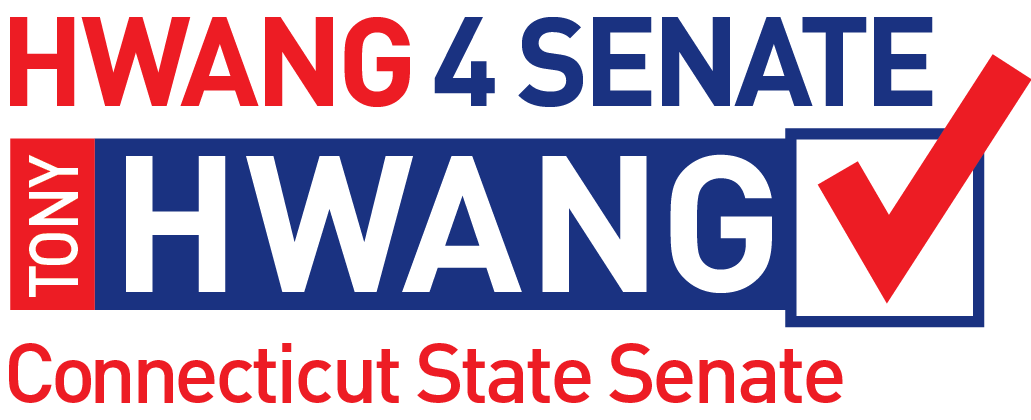Standing Strong for Connecticut Ratepayers: Fighting Back Against Skyrocketing Energy Costs



Article as it appears on News12
CONNECTICUT – A proposed bill in Connecticut would allow paramedics to work on injured K-9 officers and transport them by ambulance to veterinary hospitals.
Right now, officers are allowed to treat their K-9s on scene and transport them using their squad cars.
State Rep. Brenda Kupchick and state Sen. Tony Hwang co-sponsored the bill. If passed, it would allow paramedics to treat K-9s injured in the line of duty on scene and also transport them in an ambulance to a veterinary hospital.
Only a handful of states, including New York, have passed similar legislation.
Those laws would allow the transport of K-9s only if people are not in need of an ambulance at that time.
Connecticut’s bill was introduced earlier this month at a Public Health Committee hearing.
If it makes it out of committee, the bill would need approval from both the state house and senate before heading to the governor’s desk.
WHAT: Anti-Bullying Informational Forum
WHEN: 7:00pm Thursday, March 14th, 2019
WHERE: Greenfield Hill Congregational Church, 1045 Old Academy Rd, Fairfield, CT
State Senator Tony Hwang is hosting and moderating an Anti-Bullying Forum on Thursday, March 14th at Greenfield Hill Congregational Church in Fairfield. The general public is welcome to share their experiences in a open and supportive environment and participate in question and answer segments with the following expert panelists:
The panel will focus their discussion on the causes of bullying, challenges associated with today’s world, and how we can combat bullying and foster a more secure and safe environment.
“In today’s dynamic and frenzied world, children and adults suffer from bullying in many ways, be it in person or online,” said Senator Hwang. “And in a time where we are expanding our understanding of mental health and brain development, informational forums like these, where we can educate children and parents about some of the serious concerns they may have, are crucial to ensuring the safety, security, and self-esteem of those in our community and especially our young people.”
Please join us and help spread the message and invite others to attend. Register on Eventbrite HERE to ensure reservation.
 State Senator Tony Hwang (R-28), as a member of the General Assembly Transportation Committee, released the following statement following the March 6th public hearing on Tolls/Mileage Tax.
State Senator Tony Hwang (R-28), as a member of the General Assembly Transportation Committee, released the following statement following the March 6th public hearing on Tolls/Mileage Tax.
Senator Hwang spoke with Transportation Commissioner Joseph Giulietti, OPM Budget Secretary Melissa McCaw, and Economic Community Development Commissioner-Designate David Lehman on Wednesday, questioning the rationale of Gov. Lamont’s vision for CT’s infrastructure/transportation improvement.
Governor Lamont’s vision is based on additional tax revenue to fund infrastructure improvements by instituting electronic tolls rather than looking for structural savings, cost efficiencies and project prioritization. Hwang disagreed with creating the new mileage tax and insisted on using prioritized bonding under a debt diet and exploring innovative public private partnerships to invest in Connecticut’s infrastructure without creating new taxes on Connecticut residents.
Senator Hwang further emphasized the Democratic legislative leadership and Gov. Lamont’s complete lack of a definitive plan on how tolls could be implemented, remarking that “The current sense of urgency to vote on tolls is literally putting the cart before of the horse.”
Senator Hwang raised the concern of the lack of “public trust” that toll revenue will be used only for infrastructure/transportation improvements. He cited examples of the imposition of the income tax over 25 years ago, the gas tax for transportation, and lottery taxes purportedly intended for education – all of which were dedicated for specific purposes but ended up feeding insatiable spending from the general fund.
Recently, Governor Lamont’s proposed biennium budget flip flopped on his campaign promise of truck-only tolling. His budget also swept millions from the car sales tax funds specifically allocated to stabilize the Special Transportation Fund (STF). This flies in the face of the spirit of the Transportation Lock Box that voters ratified during the 2018 election and further reinforces the public belief that state government cannot be trusted with additional tax revenue from tolling.
“This is a mileage tax, plain and simple. Unlike other states, CT is not looking to toll specific infrastructure projects, such as a bridge or tunnel. Rather, it sprawls toll gantries all over the state, taxing you for how many miles you drive. The federal government has even described Lamont’s mileage-based toll proposal as ‘new territory,’ unlike any other state’s approach to tolls,” said Senator Hwang.
You can find a clip of Senator Hwang’s exchanges with DOT, DECD, OPM Leadership during the Public Hearing here: HWANG TRANSPORTATION CT-N
 Senator Hwang advocates raising health awareness and regulation on youth purchase of nicotine, tobacco products while maintaining choice for those 21 years or older.
Senator Hwang advocates raising health awareness and regulation on youth purchase of nicotine, tobacco products while maintaining choice for those 21 years or older.
State Senator Tony Hwang joined his fellow Senate Republicans for a press conference concerning a Safe & Healthy Connecticut in February to support the passage of certain health and safety bills including one aimed at combating youth vaping and nicotine addiction.
HB 7200 – An Act Prohibiting the Sale of Cigarettes, Tobacco Products, Electronic Nicotine Delivery Systems and Vapor Products to Persons under Age Twenty-one.
This Bill would raise the minimum age to purchase cigarettes, tobacco and vaping products from 18 years old to 21 years old. Senator Hwang emphasized his respect of individual freedom of choice for those 21 years or older to make their own personal health decisions, without government mandated policies.

HB 7200 is intended to protect our youth. Medical science has proven that brain function and physical health is severely affected in those using nicotine that have not yet fully developed. According to the 2017 Youth Tobacco Surveillance Report, among teens who reported using electronic cigarettes within the last 30 days, 59.3% said they obtained them “From a Friend”. This bill seeks to lessen the chances of teenagers obtaining tobacco and vaping products from friends and classmates who are already 18 years old.
“The prevalence of e-cigarette use and vaping among our younger population is a very serious and alarming issue. These products are often marketed to young people in a similar manner as the Joe Camel cartoon from Camel Cigarettes that was banned many years ago,” said Senator Hwang. “The development and marketing of flavors like bubblegum and cotton candy are targeted squarely at younger potential users. Furthermore, these companies market their products as a ‘safe alternative’ to cigarettes when in reality, they are not. These devices often contain higher amounts of addictive nicotine than cigarettes, and we are creating pipeline of younger users vulnerable to damaging lifetime health effects.”
“I am also very concerned about the finding from the 2017 Connecticut Youth Tobacco Surveillance report that more than half of e-cigarette users had used their vaping devices for substances other than nicotine, including marijuana and THC oils.”
The American Cancer Society emphasized that effective Tobacco 21 legislation should include all tobacco products, including, but not limited to, electronic cigarettes and should also provide for public education, training for retailers, and enforcement measures related to retailer licensing.
Senator Hwang offered, “I am open to this legislation being about more than just the legal age to purchase electronic cigarettes. I am open to discussions surrounding restrictions on flavors, enforcement mechanisms, and broadening the legislation to include all tobacco products. Anyone age 21 years or older is entitled to freedom of choice, but I believe it is our job to protect young people from those wishing to profit at their expense.”
According to the 2018 National Youth Tobacco Survey, increased use of e-cigarettes (78% increase among high schoolers, 48% increase among middle schoolers) has driven a 38% increase in use of any tobacco product among high school students.
“The data show that e-cigarette use is hurting the progress we have made when it comes to controlling tobacco use among teens. We need to act now to ensure that this epidemic is stopped in its tracks.”
You can find the video of Senator Hwang’s participation in the Senate Republican Press Conference on Health & Safety HERE.
State Senator Tony Hwang represents Connecticut’s 28th Senate District which includes the towns of Fairfield, Westport, Weston, Easton, Newtown & Sandy Hook.

Packed room where Rep. Gail Lavielle hosted a press conference with House & Senate colleagues to fight against Forced School Regionalization on March 1st, 2019
*****
State Senator Tony Hwang (R-28) released the following statements following the Education Committee Public Hearing on March 1st considering several bills (SB 457, SB 874, HB 7150 & SB 738) surrounding forced school regionalization and redistribution of teachers’ pension liabilities onto municipalities.
“These bills assume a one size fits all approach to regional school districts. Creating an arbitrary number of students or residents that trigger forced regionalization will not lead to best results. Depending on the size of the town and part of the state, regionalization could even result in higher costs and reduced efficiencies. For those towns where regionalization creates synergistic opportunities and cost efficiencies, consolidation is already happening and we should focus on breaking down barriers to natural regionalization.”
“We elect our school board members to do what is best for our schools. If those members think regionalizing with another town(s) is responsible and prudent, then it is their responsibility to make that case to the people they represent. That way would certainly lead to better results, where proposals to regionalize certain districts are vetted on a case by case basis instead of just creating a random threshold imposed by the State.”
“Ways to make our school systems run more efficiently certainly need to be encouraged and investigated, but our end goal is always the same: the best education for our students. Our town BOE’s should continue to investigate ways to improve our schools and make things more efficient, but they should not have the threat of forced regionalization hanging over their heads to do that.”
Senator Hwang also took the opportunity to discuss, for the second time, his serious concerns with Governor Lamont’s budget proposal and its effects on municipal and education aid.
“Furthermore, Governor Lamont has proposed penalizing small districts that ‘choose’ not to ‘re-district’ or ‘regionalize’. This is a false choice and this kind of heavy handed approach to forcing a quick and dramatic change to municipal organization reminds me of his predecessor, not the collaborative persona I have come to expect from the Governor. This is not a carrot, it is a burdensome financial hammer!”
“And forcing 25% of teachers’ pensions, a state obligation, onto towns overnight? How does Gov. Lamont expect our municipalities to budget and organize for all these changes and new costs over one budget cycle? Our towns constantly struggle with the state’s unpredictable budget. And in the midst of all this uncertainty he is asking for more money from them as well, just as I warned he would in my letters to the leadership of towns in my district earlier this year and my recent letter to Governor Lamont.”
“I hope he starts to feel the pressure that I am hearing about, because our municipalities, our schools, and our constituents are saying loud and clear that this is unacceptable.”
While encouraging towns to share services is a laudable goal, each school and school district has unique needs and forcing towns and cities to regionalize without considering those needs creates a whole host of problems:
“Many of you have already called and written to my office and your opinion is important. If you want to speak out about proposals about either ‘forced regionalization’ and/or ‘teacher pension redistribution’ please share your thoughts with my office at (860) 240-8805 and tony.hwang@cga.ct.gov or submit written testimony to the Education Committee at edtestimony@cga.ct.gov.”
Written Testimony of: State Senator Tony Hwang, 28th District
To: The Legislature’s Education Committee
In Opposition to: SB 457, SB 738, SB 874 & HB 7150
Public Hearing – March 1st, 2019
I appreciate the opportunity to submit this testimony to you today in strong opposition to forced school regionalization, and certain cost-shifts onto our municipalities outlined in SB 457, SB 738, and in Governor Lamont’s proposed SB 874 & HB 7150
These bills assume a one size fits all approach to regional school districts. Creating an arbitrary number of students or residents that trigger forced regionalization will not lead to best results. Depending on the size of the town and part of the state, regionalization could even result in higher costs and reduced efficiencies. For those towns where regionalization creates synergistic opportunities and cost efficiencies, consolidation is already happening and we should focus on breaking down barriers to natural regionalization.
We elect our school board members to do what is best for our schools. If those members think regionalizing with another town(s) is responsible and prudent, then it is their responsibility to make that case to the people they represent. That way would certainly lead to better results, where proposals to regionalize certain districts are vetted on a case by case basis instead of just creating a random threshold imposed by the State.
Ways to make our school systems run more efficiently certainly need to be encouraged and investigated, but our end goal is always the same: the best education for our students. Our town BOE’s should continue to investigate ways to improve our schools and make things more efficient, but they should not have the threat of forced regionalization hanging over their heads to do that.
Furthermore, SB 874 proposes penalizing small districts that ‘choose’ not to ‘re-district’ or ‘regionalize’. This is a false choice, and this kind of heavy handed approach to forcing a quick and dramatic change to municipal organization reminds me of our previous Governor, not the collaborative persona I have come to expect from the current administration. This is not a carrot, it is a burdensome financial hammer!
And forcing 25% of teachers’ pensions, a state obligation, onto towns overnight? How can we expect our municipalities to budget and organize for all these changes and new costs over one budget cycle? Our towns constantly struggle with the state’s unpredictable budget. And in the midst of all this uncertainty he is asking for more money from them as well, just as I warned he would in my letters to the leadership of towns in my district earlier this year and my recent letter to Governor Lamont. HB 7150 addresses some serious issues in education and I understand that we must find ways to cut costs. However, Section 6 and others that “find savings” simply by pushing costs onto municipalities must be reconsidered.
Encouraging towns to share services is a laudable goal. However, each school and school district has unique needs and forcing towns and cities to regionalize without considering those needs creates a whole host of problems:
Subscribe to our newsletter to stay updated.






Subscribe to our newsletter to stay updated

TONY HWANG. COMMITMENT TO COMMUNITY © 2024
PAID BY HWANG4SENATE 2024, TREASURER, LORETTA CHORY, APPROVED BY TONY HWANG